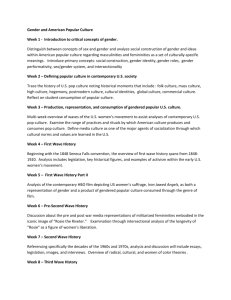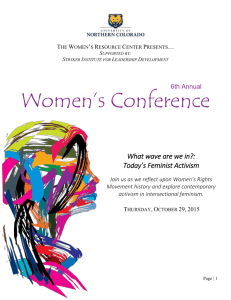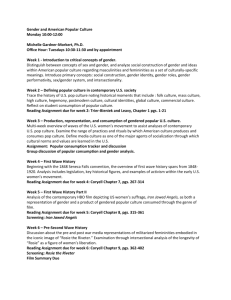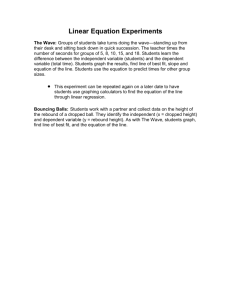Principles of Gender Theory: U.S. Perspectives Monday 15:00
advertisement
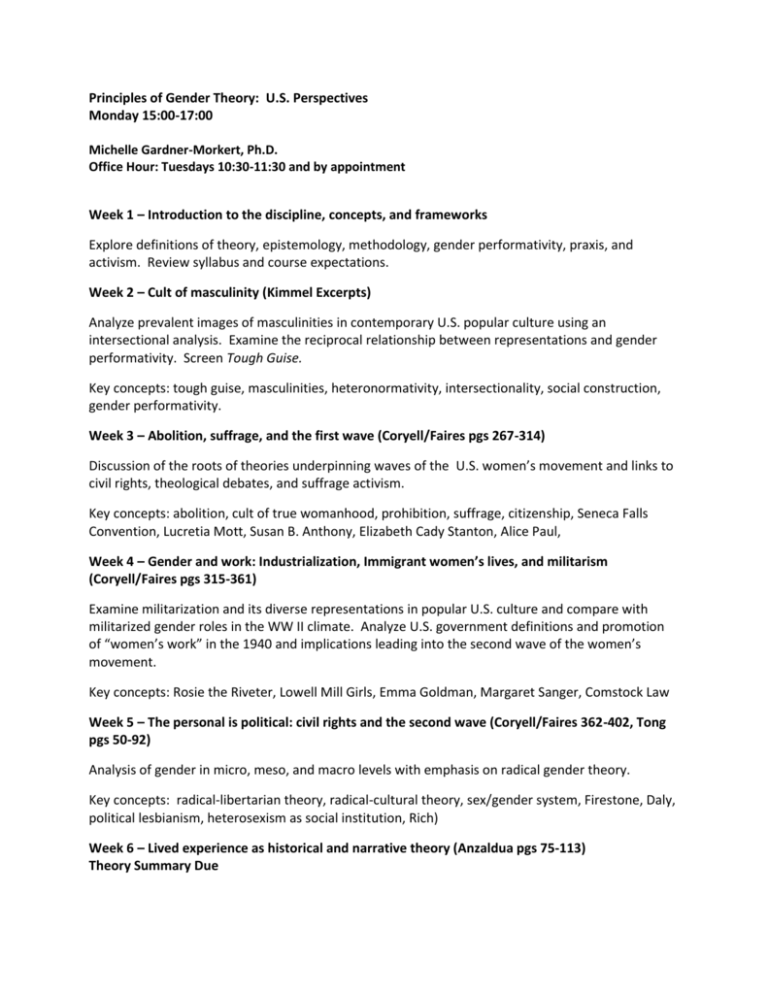
Principles of Gender Theory: U.S. Perspectives Monday 15:00-17:00 Michelle Gardner-Morkert, Ph.D. Office Hour: Tuesdays 10:30-11:30 and by appointment Week 1 – Introduction to the discipline, concepts, and frameworks Explore definitions of theory, epistemology, methodology, gender performativity, praxis, and activism. Review syllabus and course expectations. Week 2 – Cult of masculinity (Kimmel Excerpts) Analyze prevalent images of masculinities in contemporary U.S. popular culture using an intersectional analysis. Examine the reciprocal relationship between representations and gender performativity. Screen Tough Guise. Key concepts: tough guise, masculinities, heteronormativity, intersectionality, social construction, gender performativity. Week 3 – Abolition, suffrage, and the first wave (Coryell/Faires pgs 267-314) Discussion of the roots of theories underpinning waves of the U.S. women’s movement and links to civil rights, theological debates, and suffrage activism. Key concepts: abolition, cult of true womanhood, prohibition, suffrage, citizenship, Seneca Falls Convention, Lucretia Mott, Susan B. Anthony, Elizabeth Cady Stanton, Alice Paul, Week 4 – Gender and work: Industrialization, Immigrant women’s lives, and militarism (Coryell/Faires pgs 315-361) Examine militarization and its diverse representations in popular U.S. culture and compare with militarized gender roles in the WW II climate. Analyze U.S. government definitions and promotion of “women’s work” in the 1940 and implications leading into the second wave of the women’s movement. Key concepts: Rosie the Riveter, Lowell Mill Girls, Emma Goldman, Margaret Sanger, Comstock Law Week 5 – The personal is political: civil rights and the second wave (Coryell/Faires 362-402, Tong pgs 50-92) Analysis of gender in micro, meso, and macro levels with emphasis on radical gender theory. Key concepts: radical-libertarian theory, radical-cultural theory, sex/gender system, Firestone, Daly, political lesbianism, heterosexism as social institution, Rich) Week 6 – Lived experience as historical and narrative theory (Anzaldua pgs 75-113) Theory Summary Due Analysis of Gloria Anzaldua’s theory of border crossing and identities in Borderlands/ La Frontera. Juxtapose Anzaldua’s work collective and individual work with liberal gender theory. Key concepts: mestiza, border crossing, sexuality, ethnicity, citizenship, liberal theory, Mill, Wollstonecraft, National Organization of Women (NOW), Friedan, Alison Jaggar) Week 7 – Constructing identity: social and cultural capital (Coryell/Faires 509-520, Tong pgs 93125) Analysis of Socialist/Marxist gender theory in U.S. scholarly traditions and applications to gendered labor and the body. Key concepts: consciousness, economics, wage gap, global market, labor, society, family relations, child-rearing, Mitchell, Hartmann, Young Miss Representation Screening Week 8 – Midterm Exam Week 9 – Intersectional approaches to gender (Tong pgs 211-253, Lorde Excerpt, Hill-Collins Excerpt) Comparative analysis of intersectionality as a concept emerging from women of color gender theory. Analysis of the work of Audre Lorde and Patricia Hill Collins as illustrations of women of color gender theory. Particular analysis of tropes of welfare mother, mammies, and matriarchs. Evaluate the need for intersectional analyses of gender, sexuality, race, class, ethnicity, religion, age, and ability in the United States WGS fields. Key concepts: multiculturalism, intersectionality, human rights discourse, sexuality, womanism, African American/Black feminism, mixed race feminism, Latin American/Latina feminism, Asian American feminism, Indigenous feminism, global, postcolonial, and transnational theories. Week 10 – Womyn’s music, arts, and activism Analysis of artistic and activist exploration of questions about power, gender and sexuality, practices of racialization, nationalism, language, ableism, spirituality, and meaning. Key concepts: Ecofeminism, militarism, Starhawk, Dinnerstein, Chicago, Michigan Womyn’s Music Festival, Indigo Girls, Ani DiFranco, Bikini Kill, Le Tigre, Sleater Kinney, Guerilla Girls. Theory Summary Due Week 11 – Queer theory and the third wave (Essay Excerpts) Overview the interdisciplinary field of queer theory from its emergence two decades ago to present day articulations. Analyze definitions of queer, homosexuality, gay, lesbian, transgender, and cisgender. Key concepts: LGBTQIA identities, androgyny, female masculinities, discourse, power, knowledge Week 12 – Deconstructing, reclaiming, and globalizing (Tong pgs 173-210) Survey social constructionist and other queer, postmodern, post-structural and anthropological theories and ideas about gender, sex, and sexuality in the third wave of U.S. women’s and gender studies. Key concepts: Sartre, de Beauvoir, Butler, Derrida, Foucault, Cixous “other,” coherent self, dichotomies, power relations, performativity, queering, universal knowledge, gender norms. Week 13 – Riot Grrls, slut walks, and the blogosphere (Baumgardner Essay) Theory Summary Due Appraise modes of discourse and articulations in U.S. feminist activism with specific attention to sexual assault protests, media representations, and social networking as activism. Screen poetry slam performances as a space of interrogation and revolution. Key concepts: Sexual Assault, discourse, globalization, transnational theory, activism, poetry slam culture, queer youth identity, Bechdel test. Week 14 – Fourth wave: contemporary debates Explore the possibilities of a fourth wave and define the new directions of the women’s and gender studies field transnationally. Begin the final discussions and applications of current gender debates in the U.S. Begin to discuss relevance of U.S. theories and activism with student insights into contemporary Croatian culture. Key concepts: Analysis of topics to be selected by instructor and students. Week 15 – Fourth wave: contemporary debates Complete the discussion Key concepts: analysis of topics to be selected by instructor and students. Final Exam Paper Due via E-mail: Assignments: All papers should be written in MLA format and should include proper citation. One tzped page should equal 250 words. Please include a total word count at the bottom of the final page of the text, excluding the List of Works Cited Page. Attendance and participation Contemporary Application Conversations (2) Theory Summary Essays (3) – four student conversations per week Midterm Exam Final Paper Contemporary Application Conversation- Each student will lead two 15 minute class discussions about the relevance of a selected theory. Grades will be based upon evidence of contemporary gender issue (article, etc.) and mastery of the primary theoretical inquiry. Students will extrapolate theoretical questions from the readings and lectures to use as the basis for the class discussion. Submit the articleessay, etc. outlining the contemporary issue and 3-5 key quotes that guide the conversation. Theory Summary Essays – Throughout the semester students will select a theory and write a three page (750 word, excluding List of Works Cited Page) essay that explores the tenants of the particular epistemological perspective. Students may include elements of comparison/contrast toward the end of the semester. Due dates are listed on the syllabus. Midterm Exam – All students will take an in-class midterm examination. Final Essay- All students must submit the final essay via e-mail to pass the course.
